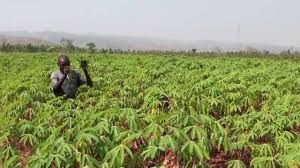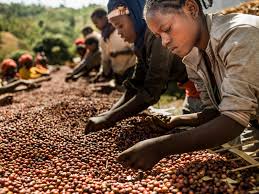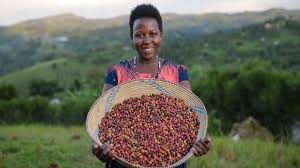![]()
If you’ve landed on this article page, you’re probably searching for a
good business idea—an idea that’s light on the pocket but heavy on
returns, promising both a fulfilling journey and potential profit.
|
How To Start Coffee Beans Farming
Business In Nigeria
A coffee bean is a seed of the Coffea plant (Coffea liberica and
Coffea racemosa) which can be processed into the popular brewed
drink called coffee. Coffee is the second most popular and
traded commodity in the world, after oil, and has seen rapid
growth in local and international markets. Small scale farmers
and large scale farmers contribute to the rapid growth of the
Coffee market, earning progressively from the outcome.
Types Of Coffee Beans
Arabica is by far the most common and most heavily marketed type
of coffee because it is harder to grow. It has a sweeter,
aromatic, and more delicate flavour and the coffee is less
acidic and has low caffeine content. 80% of the coffee produced
worldwide is from this type of coffee bean. Arabica coffee is
best served hot, as its taste depreciates once cold. It is
mostly farmed in areas with high elevation of the sea level,
especially regions that experience plenty of rainfall.
2). Robusta (Coffee caniphora):
Robusta coffee bean is known for its strong and often harsh
flavour profile. Robusta coffees have 2.5% more caffeine than
other types. It sells faster than the other coffee types because
it is high in caffeine and has a lot of potent properties. The
flavour of the Robusta coffee is so strong that the addition of
milk or sugar cannot alter it.
3). Liberica (Coffee liberica):
Liberica coffee beans are a rare treat grown in particular
climates. It has a very woody, full and slightly smoky flavour
with a floral and fruity aroma. Liberica coffee is often mixed
with other coffee types to enhance its flavour.
4). Excelsa (Coffee liberica var. dewevrei):
The fourth popular type of coffee bean is the excelsa. Excelsa
is a member of the Liberica family but its taste and properties
are distinct. Like the Liberica coffee, Excelsa is a rare treat
mostly grown in Southeast Asia. It accounts for a small fraction
of 7% of the world’s coffee circulation. It is blended with
other coffee types to give the coffee an extra boost of flavour
and complexity. Excelsa boasts of a more tart, fruitier flavour
than the other coffee types and has a lighter aroma and caffeine
level with an unusual depth of a dark flavour profile.
1). Land Preparation:
Coffee trees mostly grow in areas with plenty of rainfall. The
soil depth is a crucial detail when considering starting a
coffee farm. The soil should be well-drained, moist, loose and
rich in organic matter. The soil must have the necessary
minerals such as Zinc, Carbon, and Hydrogen. A loamy soil of up
to 150cm in-depth and an acidic pH level of at least 4.5 ensures
the coffee tree can absorb nutrients well. Consider testing the
soil to be sure it has all the necessary nutrients before
deciding on the manure/fertilizer to utilize. The land for
planting coffee should be prepared a year before the coffee is
planted. It should be cleared, and all trees and roots uprooted.
The land should be ploughed or harrowed to create a slope up to
15% with rows across the slope. Also plant ground covers to
avoid erosion.
Coffee is planted in rows 2m apart with plants 1.5m apart within
the row. The row direction is ideally a north/south direction
due to the facing of the sun. For places with intense sunlight,
shade trees are planted a year before the planting of the coffee
seed to protect the young coffea tree from drought stress and
overexposure to sun which turns the leaves yellow, and can
ultimately kill them. Shading the Coffea tree promotes a better
balance between flowering and growth, which results in better
berry production. The legumes used as shade trees provide
organic matter that contribute to the health of the soil.
2). Irrigation:
If you intend on using an irrigation process, it is best to
install one before planting the coffee trees. If you are not
using an irrigation system, both shade trees and coffee will
require thorough hand watering. Irrigation is necessary where
there is very little rainfall.
3). Planting The Seedlings:
Selecting a good seed is crucial to growing quality coffee. If
the berry is not ripe, the seed is not ready for planting.
Unripe seeds cannot germinate well and will likely rot. Never
keep the seeds above two weeks after selection.
Planting Coffee takes two stages: nursery planting and
transplanting. For the initial stage, you will require either a
tin can, or a polythene bag, or a small plot of land, depending
on your preference. It is advisable to plant early in the
morning or late at night during the planting seasons. When
planting, put the seeds in flat, with the groove side facing
downwards. Try not to push the seedlings in the soil too much,
otherwise, it will not have enough air. Water regularly, as
newly planted coffee seeds require a lot of water. An irrigation
system in place makes it easier to water the seeds. If you are
using a pot or polythene bag, place the bags/pot containing the
seeds under a shade tree.
4). Prepare The Holes For Transplanting.
This process is carried out a month before the coffee is
planted. Start by marking the planting holes. Dig holes that are
50cm deep, 50cm long, and 50cm wide, and leave 30cm between each
hole. After digging the holes, heap the topsoil on one side and
bottom soil on another side (do not put the bottom soil and the
topsoil on the same side), cover the dug-out soil to prevent sun
damage or erosion. Mark the centre of the hole with a stick.
The coffee bean farming business holds lots of promise across
the world, thanks to its high demand rates. Coffee bean farming
in Nigeria can be a lucrative and profitable venture to
start-up, due to its vast market demand and on your ability to
build a wide network. If you’re looking for a lucrative business
to venture into, the coffee bean farming business in Nigeria is
a great option to explore.
Get our Training Guide on How to set up a Lucrative Coffe
Farming in Nigeria. The sector holds lots of promise both for
farmers and agro-businesspersons. If you’re considering starting
a lucrative coffee bean business, you will find a detailed guide
on what steps to take and pitfalls to avoid
|







